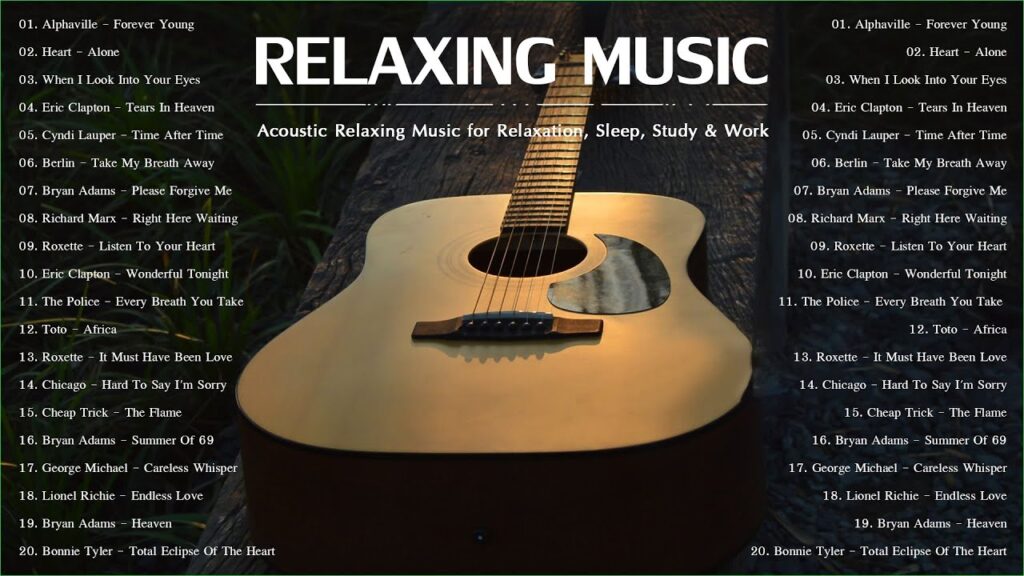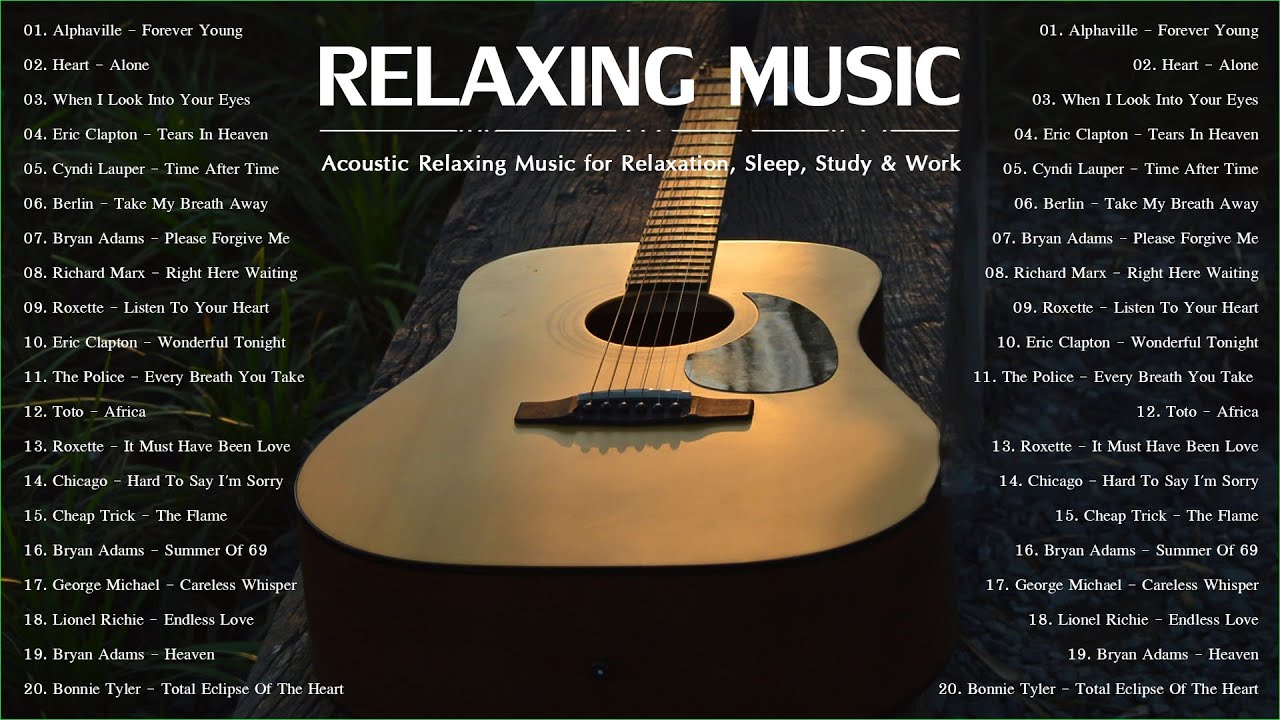
Unlock Deep Sleep: The Power of Slow Acoustic Music
Struggling to fall asleep? Tossing and turning for hours? You’re not alone. Millions face this nightly battle. The good news is that a simple, natural remedy may be the answer: slow acoustic music for sleep. This article delves into the science and art of using gentle, calming acoustic melodies to lull you into a peaceful, restorative slumber. We’ll explore why it works, how to choose the right music, and how to create the perfect sleep sanctuary, drawing upon expert insights and practical advice to help you reclaim your nights.
The Science Behind Slow Acoustic Music and Sleep
The connection between music and sleep is profound, rooted in our biology and psychology. Slow acoustic music, characterized by its gentle melodies, simple instrumentation, and calming rhythms, directly impacts our bodies in ways that promote relaxation and sleep. Understanding these mechanisms is key to harnessing its full potential.
Slowing the Heart Rate: Studies indicate that listening to slow-tempo music can synchronize with our heart rate, gradually slowing it down. This physiological shift signals to the body that it’s time to relax, reducing the feelings of anxiety and restlessness that often keep us awake.
Reducing Cortisol Levels: Cortisol, the stress hormone, is a notorious sleep disruptor. Slow acoustic music has been shown to lower cortisol levels, creating a calmer internal environment conducive to sleep. This is particularly beneficial for individuals who experience stress or anxiety before bed.
Releasing Endorphins: Music can trigger the release of endorphins, natural mood boosters that promote feelings of well-being and relaxation. These endorphins can help to counter negative thoughts and emotions that might interfere with sleep.
Brainwave Entrainment: The rhythmic nature of music can influence our brainwave patterns, a phenomenon known as brainwave entrainment. Slow acoustic music, with its typically slower tempos, can encourage the shift from the active beta waves to the more relaxed alpha and theta waves, which are associated with drowsiness and sleep.
Masking External Noises: Slow acoustic music can also act as a form of white noise, masking distracting external sounds that might otherwise disrupt sleep. This is especially helpful in noisy environments or for individuals who are sensitive to sound.
Understanding the Qualities of Effective Sleep Music
Not all music is created equal when it comes to sleep. Certain qualities make slow acoustic music particularly effective for promoting relaxation and inducing sleep. Here’s what to look for:
- Slow Tempo: Aim for music with a tempo of around 60-80 beats per minute (BPM). This range closely matches the resting heart rate and promotes a sense of calm.
- Simple Melodies: Complex or unpredictable melodies can be stimulating rather than soothing. Opt for music with simple, repetitive melodies that are easy to follow.
- Acoustic Instrumentation: Acoustic instruments like guitars, pianos, and strings tend to produce warmer, more organic sounds that are less jarring to the ear than electronic instruments.
- Absence of Vocals (Generally): While some find vocals soothing, others may find them distracting. Experiment to see what works best for you. If you prefer vocals, choose songs with gentle, hushed vocals and calming lyrics.
- Minimal Dynamic Range: Avoid music with sudden loud or soft passages, as these can startle you awake.
Spotify as a Resource for Slow Acoustic Music
Spotify has become a go-to platform for accessing a vast library of music, including a plethora of slow acoustic tracks perfect for sleep. Its user-friendly interface and curated playlists make it easy to discover new artists and create personalized sleep soundtracks. Spotify’s algorithm learns your preferences over time, suggesting music that aligns with your taste and sleep needs. This makes it an invaluable tool for anyone seeking to improve their sleep through music.
Key Features of Spotify for Sleep Music Listeners
Spotify offers several features that enhance the listening experience for those using slow acoustic music to fall asleep. These features are designed to optimize relaxation and minimize disruptions during sleep:
- Sleep Timer: This essential feature allows you to set a timer that automatically stops the music after a specified duration. This prevents the music from playing all night, which can disrupt sleep patterns.
- Offline Playback: Premium subscribers can download their favorite sleep playlists for offline listening. This is particularly useful when traveling or in areas with poor internet connectivity.
- Crossfade: This feature creates a seamless transition between songs, preventing abrupt silences that can be jarring and disruptive.
- Personalized Playlists: Spotify’s algorithm generates personalized playlists based on your listening history, ensuring that you always have a fresh supply of calming acoustic music to choose from.
- Collaborative Playlists: Create collaborative playlists with friends or family members to share your favorite sleep music and discover new tracks.
- Podcast Integration: If you enjoy sleep stories or guided meditations, Spotify seamlessly integrates podcasts into your listening experience.
- High-Quality Audio: Spotify offers high-quality audio streaming, ensuring that you can enjoy your slow acoustic music with optimal clarity and detail.
The Advantages of Using Slow Acoustic Music for Sleep
Choosing slow acoustic music as a sleep aid offers a multitude of benefits, both tangible and intangible. It’s a natural, non-invasive approach that can significantly improve sleep quality and overall well-being.
- Improved Sleep Quality: Users consistently report falling asleep faster and experiencing deeper, more restful sleep when listening to slow acoustic music.
- Reduced Stress and Anxiety: The calming effect of the music helps to lower stress and anxiety levels, creating a more peaceful state of mind before bed.
- Enhanced Relaxation: Slow acoustic music promotes relaxation by slowing the heart rate, reducing cortisol levels, and releasing endorphins.
- Natural Sleep Aid: Unlike sleeping pills or other medications, slow acoustic music is a natural sleep aid with no known side effects.
- Improved Mood: Listening to calming music can improve your mood and create a more positive outlook on the day ahead.
- Cost-Effective: Access to a vast library of slow acoustic music is readily available through streaming services like Spotify, making it a cost-effective sleep solution.
- Personalized Experience: You can customize your sleep soundtrack to suit your individual preferences and needs, creating a truly personalized sleep experience.
A Comprehensive Review of Spotify for Sleep Music
Spotify has revolutionized the way we listen to music, and its impact on the sleep music landscape is undeniable. Its vast library, user-friendly interface, and personalized recommendations make it an excellent choice for anyone seeking to improve their sleep through slow acoustic music.
User Experience & Usability: Spotify’s interface is intuitive and easy to navigate, even for those who are not tech-savvy. The search function is robust, allowing you to quickly find specific artists, albums, or playlists. Creating and managing playlists is a breeze, and the offline playback feature is a lifesaver when traveling.
Performance & Effectiveness: Spotify’s algorithm consistently delivers high-quality recommendations, ensuring that you always have a fresh supply of calming acoustic music to choose from. The sleep timer function works flawlessly, and the crossfade feature creates a seamless listening experience.
Pros:
- Vast Library: Spotify boasts an extensive collection of slow acoustic music, ensuring that you’ll never run out of new tracks to discover.
- Personalized Recommendations: The algorithm learns your preferences over time, suggesting music that aligns with your taste and sleep needs.
- User-Friendly Interface: Spotify’s interface is intuitive and easy to navigate, even for beginners.
- Offline Playback: Premium subscribers can download their favorite sleep playlists for offline listening.
- Sleep Timer: This essential feature allows you to set a timer that automatically stops the music after a specified duration.
Cons/Limitations:
- Subscription Required for Offline Playback: Offline playback is only available to premium subscribers.
- Advertisements on Free Tier: The free tier includes advertisements, which can be disruptive during sleep.
- Potential for Distraction: The vast library can be overwhelming, making it difficult to choose the right music.
- Reliance on Algorithm: While the algorithm is generally accurate, it can sometimes recommend music that doesn’t align with your preferences.
Ideal User Profile: Spotify is best suited for individuals who enjoy listening to music, are comfortable using technology, and are looking for a cost-effective and convenient way to improve their sleep through slow acoustic music. It is especially helpful for those who enjoy discovering new artists and creating personalized playlists.
Key Alternatives: Apple Music and YouTube Music are two main alternatives, offering similar features and libraries. However, Spotify’s personalized recommendations and user-friendly interface give it a slight edge.
Expert Overall Verdict & Recommendation: Spotify is an excellent choice for anyone seeking to harness the power of slow acoustic music for sleep. Its vast library, personalized recommendations, and user-friendly interface make it a top contender in the sleep music streaming market. We highly recommend giving it a try.
Creating Your Perfect Sleep Sanctuary
While slow acoustic music is a powerful sleep aid, it’s most effective when combined with other sleep-promoting practices. Creating a sleep sanctuary in your bedroom can significantly enhance your sleep quality. Here are some essential elements to consider:
- Optimal Temperature: Keep your bedroom cool, ideally between 60-67 degrees Fahrenheit.
- Darkness: Eliminate all sources of light, including electronic devices and streetlights. Use blackout curtains or a sleep mask if necessary.
- Quiet: Minimize noise by using earplugs, a white noise machine, or soundproofing materials.
- Comfortable Bedding: Invest in comfortable mattress, pillows, and bedding that promote relaxation.
- Relaxing Aromatherapy: Use calming scents like lavender or chamomile to create a soothing atmosphere.
- Consistent Sleep Schedule: Go to bed and wake up at the same time each day, even on weekends, to regulate your body’s natural sleep-wake cycle.
- Avoid Caffeine and Alcohol Before Bed: These substances can interfere with sleep.
Reclaiming Your Nights with Music
Slow acoustic music offers a safe, effective, and enjoyable way to improve your sleep and reclaim your nights. By understanding the science behind its calming effects, choosing the right music, and creating a sleep-conducive environment, you can unlock the power of music to transform your sleep and enhance your overall well-being. Experiment, explore different artists and genres, and discover what works best for you. The journey to better sleep starts with a single, soothing melody.

